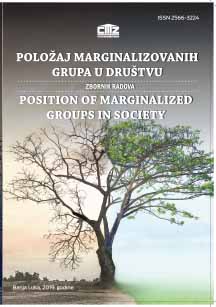FAMILY AS A FACTOR FOR RECIDIVISM AMONG CHILDREN IN CONFLICT WITH THE LAW
FAMILY AS A FACTOR FOR RECIDIVISM AMONG CHILDREN IN CONFLICT WITH THE LAW
Author(s): Sunčica Dimitrijoska, Natasha BogoevskaSubject(s): Social Sciences, Law, Constitution, Jurisprudence, Criminal Law, Sociology, Criminology, Studies in violence and power, Penology, Sociology of Law
Published by: CENTAR MODERNIH ZNANJA
Keywords: child; family; criminal act; recidivism;risk factors; self-report survey; youth crime;
Summary/Abstract: The increase of the number of children who are recidivists in perpetration of criminal acts indicates that there is inappropriate response to the needs of the children. The stratification, poverty and unemployment result with revolt of the children towards the dysfunctional system, which leads to aggressiveness and violence. The family, namely the parents are role models for perception of positive identification at children and imposing of own parenthood styles (authoritarian style, permissive style, democratic style or indifferent style). The disfunctionality of family leads to incapability for fulfilment of the obligations for assistance, care and protection of the children. The conducted research with the families related to the profile of the recidivist children in conflict with the law, resulted with cases of: children living with both parents, children with a status of children born in marriage, family not in position to control the child’s behavior, serious social problems in the family, parents with completed primary or secondary education, employed father, unemployed mother, beneficiaries of social financial assistance or with salary above 21.000 denars and children living with the parents in their own house. The results from the conducted research indicate the need for long-term solutions for proactive interventions through modification of informal and formal mechanisms in line with the needs of the children in conflict with the law. Interventions should be based on professional work with the children, their families, utilization of the local resources in the community through intensive family therapy and established support network; overall planning, implementation, monitoring and evaluation of the interventions; and modification of interventions according to the individual needs of the children.
Journal: DRUŠTVENE DEVIJACIJE
- Issue Year: IV/2019
- Issue No: 4
- Page Range: 120-126
- Page Count: 7
- Language: English

